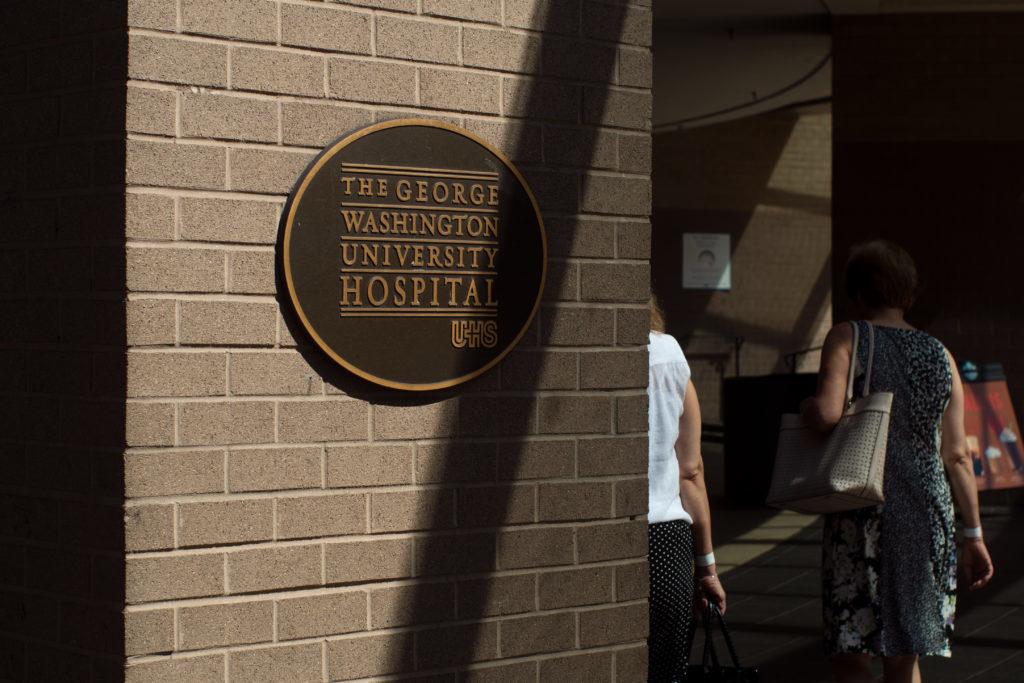The University is spending $15,000 per month to retain a lobbyist for the construction of a hospital east of the Anacostia river, according to financial records obtained by The Hatchet.
Mayor Muriel Bowser announced last August that District officials, University officials and United Health Services – a company with an 80 percent stake in the GW Hospital – will work to erect a hospital servicing wards 7 and 8 by 2023. The University hired the lobbyist to facilitate communication between the D.C. government and East End project leaders, University spokeswoman Crystal Nosal said.
“They will assist in communicating with the D.C. government on the East End project and related matters, as the District works on many fronts to improve access to healthcare and the University works to advance our academic, research and clinical care missions,” Nosal said in an email.
The D.C. Council introduced legislation in October that would bypass the District’s certificate of need requirement – which would require the hospital to demonstrate a public need for the new facility – in hopes of expediting the hospital’s construction process.
The bill would have paved the way for the addition of a 270-bed tower, later changed to 220 beds, to the hospital’s Foggy Bottom facility as part of the GW Hosptial’s agreement to construct the East End facility.
The Foggy Bottom and West End Advisory Neighborhood Commission voted against the bill in October, after Foggy Bottom residents and officials deemed the Council did not seek local input in its proposal. In May, the Council removed the section of the agreement that would have scrapped the certificate of need for the tower.
GW has paid the lobbyist, from the law firm Squire Patton Boggs, a retainer fee to lobby for the construction of the medical facility on a monthly basis since January, totaling $120,000 in University funds, according to the University’s financial records. Nosal declined to say how GW decided which law firm to hire the lobbyist from and which officials were involved in the decision.
“The University is committed to quality healthcare in the District of Columbia,” Nosal said. “We continue to be supportive of the East End hospital project. If the GW Medical Faculty Associates physicians can be appropriately reimbursed, we want to be part of that effort.”
The University spent more than $19,000 on lobbyists in the 2016 fiscal year to garner more information about a Virginia sexual assault bill mandating that universities indicate whether a student was expelled or suspended for sexual assault on their official transcript. The amount exceeded the University’s cumulative lobbying expenditures from the previous six years, but fell short of GW’s peer schools’ lobbying costs, which average about $261,000 per year.
Suzanne Ianni, a registered healthcare lobbyist in New Jersey, said universities may hire lobbyists to track pending legislation and advocate for positions that benefit the institution and its students. Ianni said paying a monthly fee for lobbyists is “common practice” for universities.
“Lobbying has a negative connotation, but it is not a dirty word,” Ianni said. “It can be a valuable service for education and advocacy to protect an institution and the people it serves.”
Alan Sager, a professor of health law at Boston University, said the University may hope to gain a “foothold” in the operation of the East End hospital through their lobbying expenditures.
“I have no knowledge of their actual motives,” he said. “But in general, in my experience, institutions often say the right things in public, but in private work harder to advance their own self interests.”
Sager said the $15,000 per month fee only indicates the amount of money that the University spent hiring from an outside firm, and likely doesn’t include the money spent on University employees that may also be working on this cause.
“$180,000 should be regarded as the probably minimum for spending on lobbyists, because it’s entirely possible that medical school and other University employees may also be working to lobby,” Sager said.
William Kennedy Smith, the chair of the Foggy Bottom and West End Advisory Neighborhood Commission, said the University has been involved in East End hospital negotiations since officials rebuked efforts to build the East End hospital bed tower at the GW Hospital. Smith said the University needs strong representation in legal matters because of its large presence in the District.
“I would say it’s very natural for them to hire someone, hire a good person, I would hope,” Smith said.
Smith said he’s unsure of how the lobbyist will affect the construction of the facility. He said officials likely hired a lobbyist to ensure they are “adequately represented” in the hospital negotiations.
“There is an extremely complicated and important set of public policy decisions being made in the city right now around the hospital system,” Smith said. “Any institution that is going to be impacted by those decisions would want to be adequately represented.”





